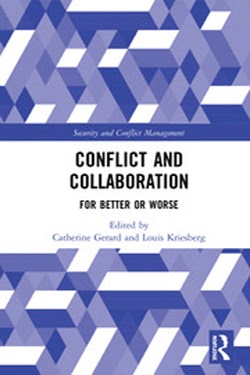Conflict and Collaboration: For Better or Worse
Catherine M. Gerard and Louis Kriesberg
Routledge, December 2018

Louis Kriesberg, professor emeritus of sociology, and Catherine Gerard, director of the Program for the Advancement of Research on Conflict and Collaboration (PARCC), edited a new book titled "Conflict and Collaboration: For Better or Worse" (Routledge, 2018). Written mostly by Syracuse University faculty, the scholars examine overlapping domains of conflict and collaboration studies and demonstrate that different mixtures of conflict and collaboration can be constructively effective.
“The central theme is that conflict and collaboration can be good, bad, or even benign, depending on a number of factors. These include the role of power, design of the process itself, skill level and intent of the actors, social contexts, and world views,” Kriesberg and Gerard write in the introduction.
Chapter contributors include John Burdick, professor of anthropology; Robert Demgenski, PhD candidate in political science; Miriam F. Elman, associate professor of political science; Suyeon Jo, Ph.D. candidate in public administration; Harry Lambright, professor of public administration and international affairs and political science; Sandra D. Lane, professor of public health; Tina Nabatchi, associate professor of public administration and international affairs; Robert A. Rubinstein, Distinguished Professor of Anthropology; Shaundel N. Sanchez, PhD candidate in anthropology; and Margaret Susan Thompson, associate professor of history and political science.
The book uses specific cases, analytical methods, and interventions, based on which detailed policy recommendations were made for many sets of actors in peacebuilding, social movements, government, communities, and academia.
“Gerard and Kriesberg have produced a provocative collection that builds on decades of productive research at the Program for the Advancement of Conflict and Collaboration (PARCC) at Syracuse University,” says Larry Susskind, co-founder of the Program on Negotiation at Harvard Law School, in his review. “Their many case studies from international relations and public engagement emphasize the importance of preparing properly, taking steps to forestall escalation and intervening to transforming conflict and collaboration when necessary, never losing sight of the importance of power dynamics, leadership and ways in which coercion can be used constructively.”
-- Edy Semaan, M.A. International Relations/MS Public Relations, anticipated '19
05/25/18
Publisher's Summary:
In this volume, scholars from different disciplines join together to examine the overlapping domains of conflict and collaboration studies.
It examines the relationships between ideas and practices in the fields of conflict resolution and collaboration from multiple disciplinary perspectives. The central theme is that conflict and collaboration can be good, bad, or even benign, depending on a number of factors. These include the role of power, design of the process itself, skill level and intent of the actors, social contexts, and world views. The book demonstrates that various blends of conflict and collaboration can be more or less constructively effective. It discusses specific cases, analytical methods, and interventions, and emphasizes both developing propositions and reflecting on specific cases and contexts. The book concludes with specific policy recommendations for many sets of actors—those in peacebuilding, social movements, governments, and communities—plus students of conflict studies.
This book will be of much interest to students, scholars, and practitioners of peace and conflict studies, public administration, sociology, and political science.